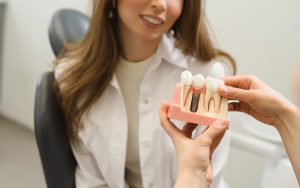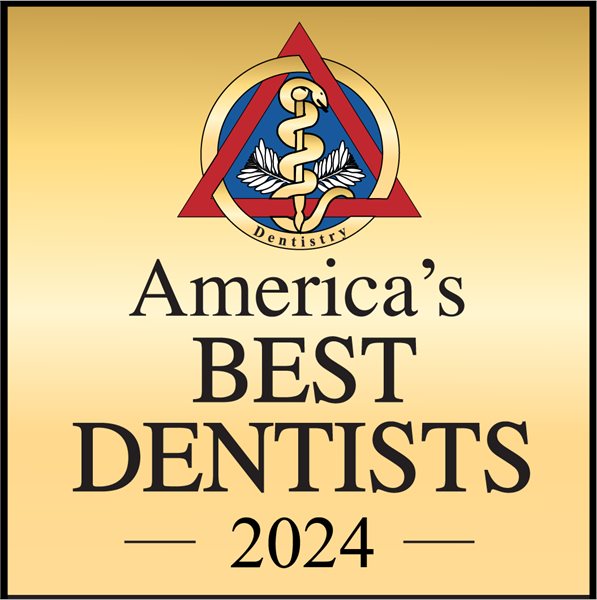Dental Implant Candidacy
Are You a Dental Implant Candidate?
While dental implants are one of the most popular tooth replacements today, not everyone may qualify for treatment. Ideal candidates for dental implants are in optimal oral health, with no indications of tooth decay or periodontal disease present in the mouth or remaining teeth. Additionally, they don’t suffer from bone loss and have enough jawbone density to secure the implant firmly.
To learn more about your candidacy for dental implants, contact our Northridge dentist today by scheduling an appointment at 818-709-8645.

Determining Candidacy for Dental Implants
Our Northridge dentist will evaluate several factors to determine if you qualify for dental implants. These factors may include:
- Sufficient bone density: Dental implants require a certain amount of bone density to provide a stable foundation. Our dentist may use X-rays or a CT scan to evaluate the amount of bone in your jaw.
- Healthy gums: Healthy gums are important for the success of a dental implant. Your dentist may evaluate your gum tissue for signs of periodontal disease or other issues.
- Good health: Your overall health can impact your ability to receive dental implants. Conditions such as uncontrolled diabetes, heart disease, or certain medications may affect your ability to undergo a dental implant procedure.
- Oral hygiene: Good oral hygiene is important. Your dentist may evaluate your brushing and flossing habits and provide recommendations for improvement.
- Age: Age may be a factor in determining if you qualify for dental implants. Children and young adults may not have fully developed jawbones, which can affect the success of implants.
- Financial Considerations: Dental implants can be costly, and insurance coverage may vary. Patients should discuss the financial aspects of the procedure with their dentist.
- Medications: Patients on certain medications, especially bisphosphonates used to treat osteoporosis, may have a higher risk of complications. Our dentist will review the patient’s medication history.
- Realistic Expectations: Patients should have realistic expectations about the outcomes of the procedure. Dental implants can provide excellent results, but they may not be suitable for every individual or situation.
- Commitment to Aftercare: Patients need to understand that dental implants require a recovery period and proper aftercare. This includes following post-operative instructions, attending follow-up appointments, and maintaining oral hygiene.
- Smoking and Alcohol Use: Smoking and excessive alcohol consumption can negatively impact the success of dental implants. Patients who smoke may be asked to quit or significantly reduce smoking before and after the procedure.
Supplemental Procedures
While dental implants are a highly effective restorative procedure for missing teeth, some people may need to undergo supplemental procedures before starting treatment.
These procedures include:
- Bone Grafting: If you have lost a significant amount of jawbone, a bone graft may be necessary to build up the jawbone before the implant can be placed.
- Sinus Lift: If you’re missing upper back teeth, a sinus lift may be necessary to raise the sinus floor and make room for the implant.
- Ridge Augmentation: If the area where the implant is needed is too narrow or has a shallow ridge, ridge augmentation may be necessary to build up the area and provide a stable foundation for the implant.
Who Isn’t a Good Candidate for Dental Implants?
While dental implants are an excellent solution for many people looking to replace missing teeth, they may only work for some. Certain factors can make someone a poor candidate for this procedure. It’s important to understand these contraindications to determine if dental implants are the best choice for your situation.
Insufficient Bone Density
One of the requirements for successful dental implants is having enough healthy jawbone to support and integrate with the implant posts. If you’ve experienced significant bone loss in your jaw, either from periodontal disease, injury, or being without teeth for an extended period, you may not have adequate bone density remaining. In these cases, a bone graft can stabilize the bone before placing implants.
Ongoing Teeth Grinding or Clenching
People who unconsciously grind or clench their teeth (bruxism) put excessive force on their teeth that can cause implants to fail over time. If you have this habit, Dr. Gropp may recommend getting a night guard before implants and making lifestyle changes to address the root cause.
Uncontrolled Medical Conditions
Certain diseases and medical conditions need to be well-controlled before getting dental implants. These include uncontrolled diabetes, autoimmune disorders, cancer, and other issues that can interfere with bone healing and increase infection risk. Your dental team will evaluate your overall health.
Heavy Smoking
Smoking increases implant failure rates due to poor healing abilities and decreased immune function. Many dentists won’t perform implant procedures on heavy smokers unless they’ve quit for a period before and after surgery.
Young Age
Dental implants aren’t generally recommended for adolescents before they’ve reached skeletal maturity, as the jaws are still developing. An exception may be made for specific situations under the guidance of an oral surgeon.
Know Your Other Tooth Replacement Options
If you’re not a dental implant candidate, there are options for replacing missing teeth. Restorations such as traditional dentures or dental bridges may be better suited for your needs. Contact our dentist today to discuss your options.

Frequently Asked Questions
Can I get dental implants if I have gum disease?
No, those with active gum disease or an untreated oral infection won’t be a good candidate for dental implants. The implant placement procedure requires a healthy jawbone and gums, so any active gum infections or disease must be treated before the tooth implant can be placed.
I have a history of smoking, does this mean I cannot get dental implants?
Smoking can affect the healing process and increase the risk of implant failure, so individuals who smoke may not be good candidates for dental implants. Your dentist or oral surgeon will evaluate your overall oral health, including your smoking history, to determine if dental implants are a suitable option for you.
Who is not suitable for dental implants?
Individuals with systemic diseases such as diabetes, Parkinson’s disease, and certain autoimmune disorders may be at an increased risk for implant complications and infections. Similarly, those suffering from osteoporosis, or taking medications for bone deterioration, may also have a higher likelihood of implant complications.
Determine Your Dental Implant Candidacy Today
Do you think dental implants are the best treatment for you? For those living in Northridge, contact our dentist today at 818-709-8645 to schedule your appointment. We’ll guide you through the treatment steps and see if you qualify for dental implants.


